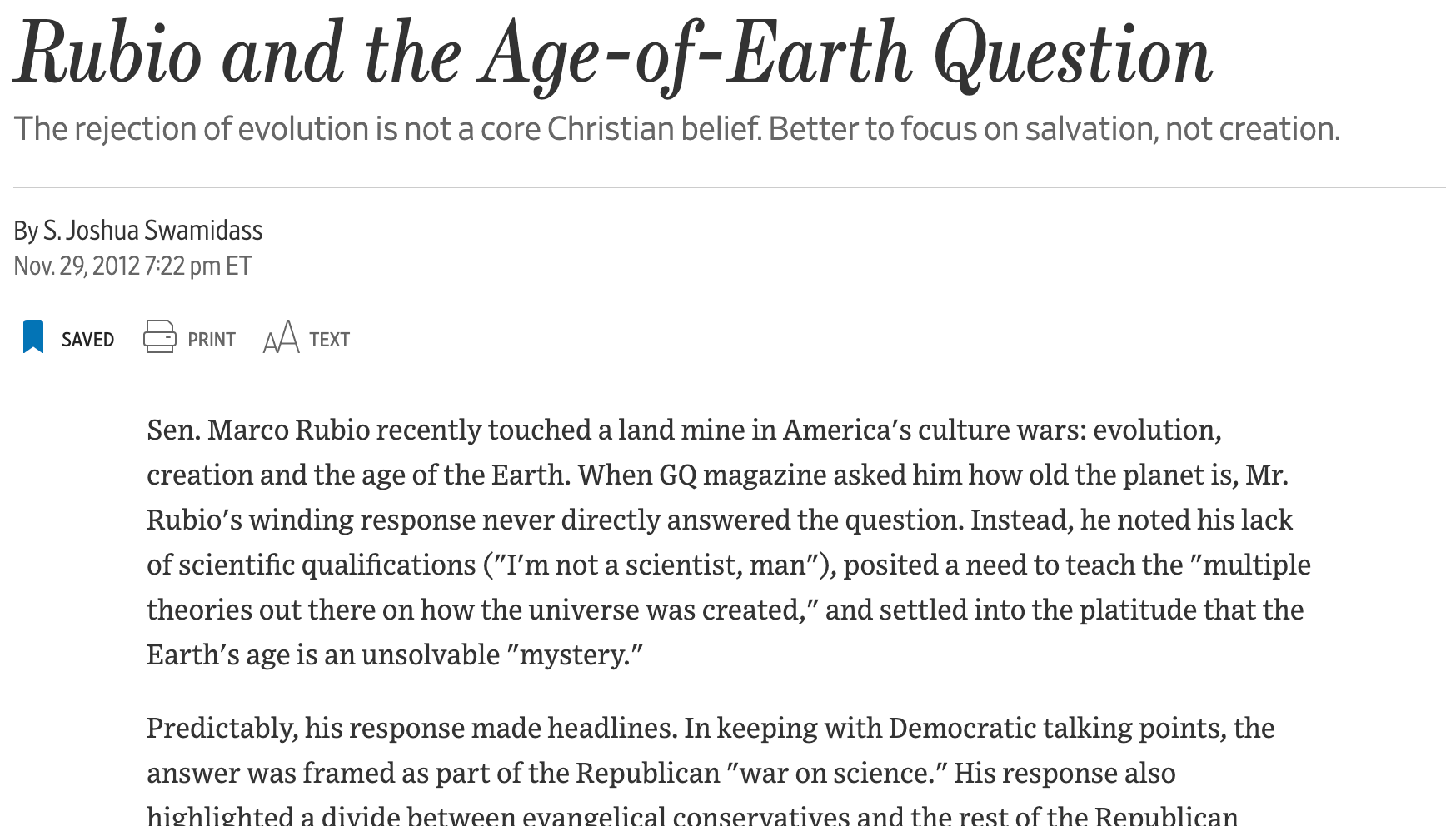
Sen. Marco Rubio recently touched a land mine in America’s culture wars: evolution, creation and the age of the Earth. When GQ magazine asked him how old the planet is, Mr. Rubio’s winding response never directly answered the question. Instead, he noted his lack of scientific qualifications (“I’m not a scientist, man”), posited a need to teach the “multiple theories out there on how the universe was created,” and settled into the platitude that the Earth’s age is an unsolvable “mystery.”
Predictably, his response made headlines. In keeping with Democratic talking points, the answer was framed as part of the Republican “war on science.” His response also highlighted a divide between evangelical conservatives and the rest of the Republican Party at a time, in the aftermath of a disappointing election, when the two sides were already eyeing each other warily. Mr. Rubio’s answer enabled his critics to cast one of the Republicans’ fastest rising stars as an ignorant religious nut. It also provided an opportunity for those hostile to Christians to lampoon them for trusting their sacred text more than science.
For conservatives, it is tempting to write off the Rubio episode as one more example of biased media coverage and anti-Christian bigotry. But such a dismissal would be a mistake. Better to regard the controversy as an opportunity for introspection.
As a Christian and career scientist, I see the episode as an opportunity for both Republicans and evangelicals to establish a more coherent policy on evolution, creation and science, for two reasons.
First, the age of the Earth and the rejection of evolution aren’t core Christian beliefs. Neither appears in the Nicene or Apostle’s Creed. Nor did Jesus teach them. Historical Christianity has not focused on how God created the universe, but on how God saves humanity through Jesus’ death and resurrection.
Currently, a debate is unfolding in theological seminaries and conferences about the correct interpretation of the Bible’s Genesis account of creation. Echoing thinkers like St. Augustine, C.S. Lewis, Mark Noll and Pope John Paul II, many of the conservative theologians in the debate believe that a serious reading of Genesis can be compatible with the scientific account of our origins.
Joining the dialogue are evangelicals who are also scientists—and with them comes a trend toward recognizing a “theistic” evolution: the role of God in creating us through an evolutionary process on a very old Earth.
The second reason that Republicans, including evangelicals, need to come up with a more coherent stance regarding the “age of the Earth” question—which journalists will always be happy to ask—is that there is simply no controversy in the scientific world about the age of the Earth or evolution. Evidence points to a 4.5-billion-year-old planet.
The evidence for evolution is just as strong. In the past, evolution rested on ambiguous fossil evidence, but now it rests on much clearer DNA evidence that increases exponentially every month. Fully appreciating this evidence takes a lot of time, reading and patience. And it is not appropriate to “teach the controversy” in science class because there is no ongoing debate in the scientific community comparable to the theological debate.
The evolution debate is not a scientific controversy, but a theological controversy about a non-central Christian doctrine. In terms of policy, neither evangelicals nor Republicans should expect secular schools to litigate doctrinal controversies in science classrooms. And Christians who try to push their view of creation through political coercion are misrepresenting their faith. The “good news” is how God saves us. Not how he created us. And it is through persuasion rather than force that he brings us to knowledge of Jesus.
Republicans have a clear path through the minefield of how-old-is-the-Earth gotcha questions. Let’s leave science curriculums to scientists.
As for Democrats: Please ditch the “war on science” talking point. It only pushes Americans apart, into their respective corners. In the two-party system, both sides need to be able to freely embrace science as a cultural common ground.
References
- https://peacefulscience.org/articles/confessing-jesus-in-science/
- https://peacefulscience.org/articles/dover-behe/
- https://peacefulscience.org/articles/miller-textbook-dover/
- https://peacefulscience.org/articles/scott-dover-science-hat/
- https://peacefulscience.org/articles/why-i-went-public-evolution/
- https://swami.wustl.edu/swamidass_cv.pdf
- https://evolutionnews.org/2012/11/epistemic_closu
- http://swami.wustl.edu
- https://peacefulscience.org/articles/age-rubios-earth/
- https://discourse.peacefulscience.org/t/_/137
- http://www.veritas.org/evidence-easter-scientists-list
- https://peacefulscience.org/articles/metzger-new-wine-new-wineskins/
- https://peacefulscience.org/about/mission-and-values/
- https://www.gq.com/story/marco-rubio-interview-gq-december-2012
- https://www.nydailynews.com/news/politics/marco-rubio-tells-gq-not-scientist-man-article-1.1204747
Nov 29, 2020
Nov 10, 2021
Jul 2, 2025





